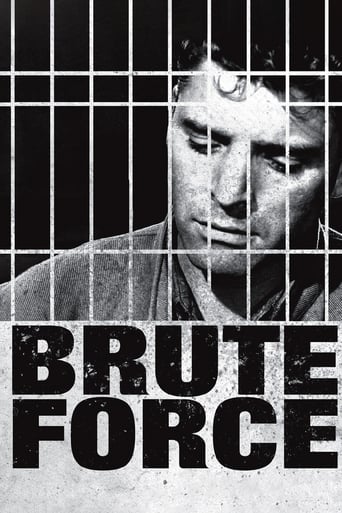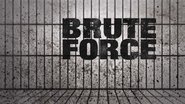grantss
Interesting prison drama.Joe Collins (played by Burt Lancaster) is a prisoner in Westgate Penitentiary. The senior officer at the prison is Captain Munsey (Hume Cronyn), a power-mad, manipulative sadist. Collins is rebellious and constantly in trouble with the prison guards. He formulates a plan to escape but a confrontation with Captain Munsey is inevitable...An interesting look at prison life, and how people act when they have absolute power. The central plot was well thought out and made for a good story. However, the stories of how all the main prisoner-characters got there sometimes seemed unnecessary and felt like padding.Solid work by Burt Lancaster and Hume Cronyn in the lead roles. Good supporting performances too.
rooee
Jules Dassin is best remembered for his seminal heist movie Rififi, which he made in Europe following his Hollywood blacklisting. Before this, in the immediate postwar period, this American director made a series of high-quality noir films on the other side of the pond, one of which was this bold prison break drama from 1947.The plot focuses on Joe Collins (Burt Lancaster) and the inmates of intimate cell R17. Sick of their ill treatment by the cruel Captain Munsey (Hume Cronyn), and conscious of the impotence of Chief Barnes (Roman Bohnen) as well as the hopelessness of decent-yet-drunk Doctor Walters (Art Smith), they plan to take matters into their own hands, overthrow the governance, and escape.The film earns its title. This is a brutal, bleak, and violent yarn by the standards of any era. But it was particularly shocking at the time – not least, perhaps, because it sets aside the basic crime-doesn't-pay moral and asks the audience to sympathise wholly with the prisoners and hate the guards. This is achieved by portraying the prisoners as plucky underdogs. No trashy exploitation here, but something closer to the conscientious social outrage of Elia Kazan's On the Waterfront. Lancaster's performance doesn't approach Brando, but the style is similarly smouldering. Repressed rage; the power of the trodden man waiting to be unleashed.The theme of power is personified by Munsey. "Kindness is actually weakness," is his mantra. Hume Cronyn is gloriously slimy in the role. Munsey is the most complex character, embodying the dangerously contained ambitions of the middle manager. Meanwhile, Doc Walters reckons the prison system is inherently flawed; that men emerge more broken than when they arrived. Then there's Overlord Barnes, weary and anxious and without strategy, responding to mass unrest by threatening to withdraw privileges from all, suppressing the inmates' individuality from the distant comfort of his office. The prison is run by this dysfunctional trio. No wonder a breakout is imminent.The good guys are the chums of R17. Some are embellished in flashback. There's the tragic story of the man – reminiscent of poor cuckolded George Peatty in Kubrick's The Killing – who steals three grand to buy his materialistic wife a fur coat. Another wound up in the slammer after taking the rap when his wife shot her father dead to save their marriage. It's all melodramatic; all about trouble with women; all great black 'n' white storytelling with a few shades of grey. As for Joe, his gal needs an operation to fix her crippled legs, but she's not going for the operation until he's out. We get to see the sentimentality behind the main man's stony façade.So, R17 is populated by lovable rogues and victims of circumstance. The rawness of Dassin's picture – its relative naturalism for the time – ensures that the setup isn't hopelessly idealised, but it is certainly romanticized, which is something that's matched by the rich aesthetic. The film looks glorious. The external sets are plausibly looming and stark, recalling the Expressionist roots upon which noir was built. The drama is frequently shot from awkward angles, giving the sense of confined spaces and enhancing the releasing power of the flashbacks. It's memory that sets the men free.Finally, there is genuine tension and excitement in the final breakout sequence. Its violence is earned and its outcome is startling. It's a fittingly intense climax to a film that grips early and tight and doesn't let go. This is persuasive, fierce filmmaking.
LeonLouisRicci
Hard-boiled prison picture, a Film-Noir filled with sadism and despair. Not much hope displayed just revenge and the possibility of a near impossible escape.It is a metaphor for Nazi Germany and Russian Stalinism. The fascist and sadistic "homosexual" Captain Munsey strips to the waist, plays romantic Wagner, and holds the rubber hose as if it were his maleness. Add the fact that he speaks in soft feminine tones leaves little doubt.Prison reform had been a progressive movement for some time, and although some improvements had been made there were still concerns in 1947, and the Director's political leanings were in evident here. He would be a victim of the HUAC witch hunt and would be branded a Communist sympathizer and leave the Country. Ironic, because there is much here that is anti-authoritarianism and anti Stalinism as well. This is a very violent and tender film with a great cast and has only a few flaws. The singing inmate and the obligatory post ending (code required) wrap up. But this is such a powerful film filled with unforgettable scenes and images that sears the conscience with its riveting recitals and brutal but hopeless breakout.
Michael O'Keefe
Gritty and intense prison drama. Joe Collins(Burt Lancaster)is one of the toughest inmates on the cell block. Gallagher(Charles Bickford)is the old-timer that has the most control of the ways of life in the over crowded West Gate Prison. Warden Barnes(Roman Bohnen)is a drunkard and political pawn. The real power belongs to Capt. Munsey(Hume Cronyn), a crass, cruel and corrupt prison guard running roughshod over the inmate population. Munsey is planning to take over the warden's job; at the same time Collins has had enough and plans to make a break. He garners support of his cell mates, but Gallagher isn't so sure. Munsey finds out about the plans of the prison break and sets up guards to stop it, with Collins the prime target for a bullet or two. Munsey puts the fix in to delay Gallagher's parole; so the savvy prisoner decides to join Collins' escape attempt. A very violent finale with a good measure of brute force. Howard Duff makes his big screen debut. Other players: Ann Blyth, Yvonne De Carlo, Vince Barnett, Whit Bissell, James Bell, Jeff Corey, Edmond O'Brien, John Hoyt and Sir Lancelot.






